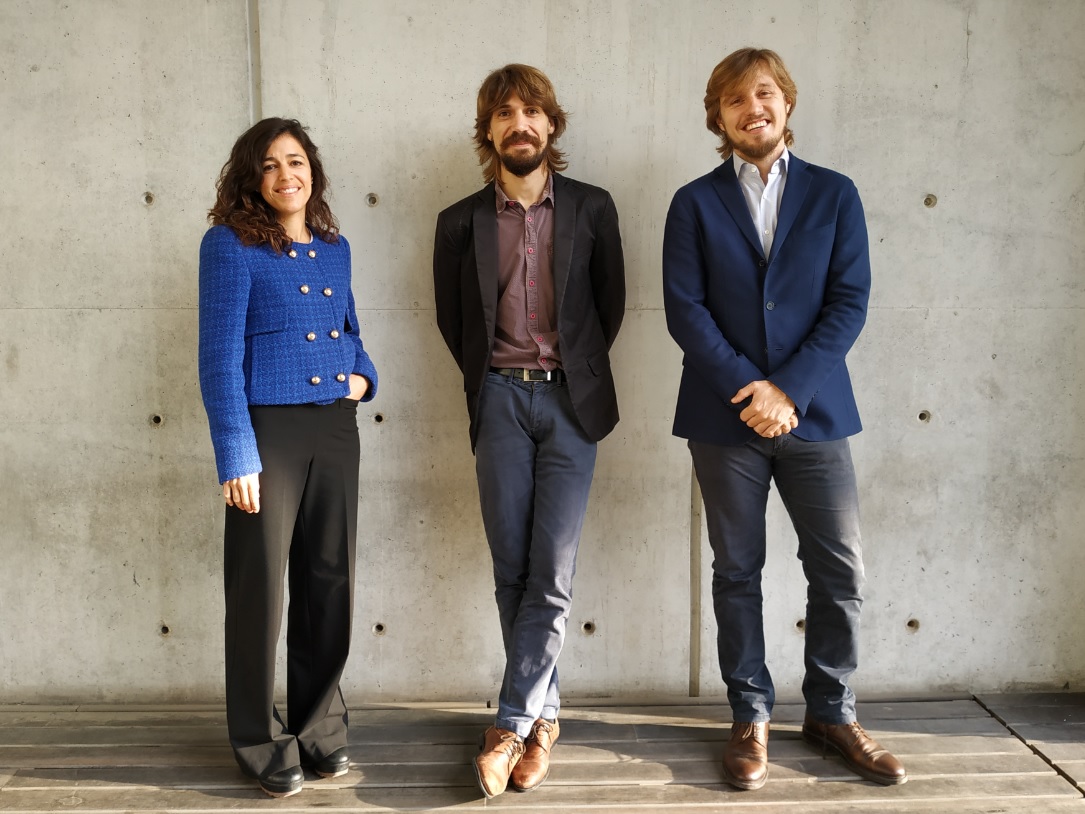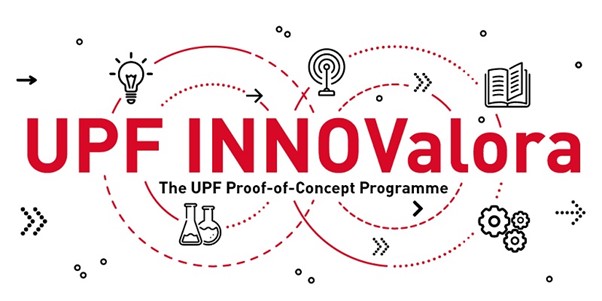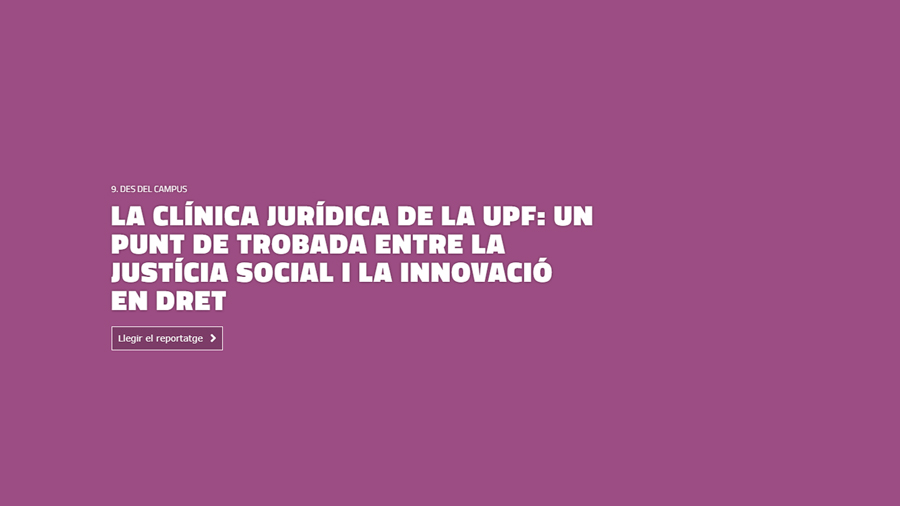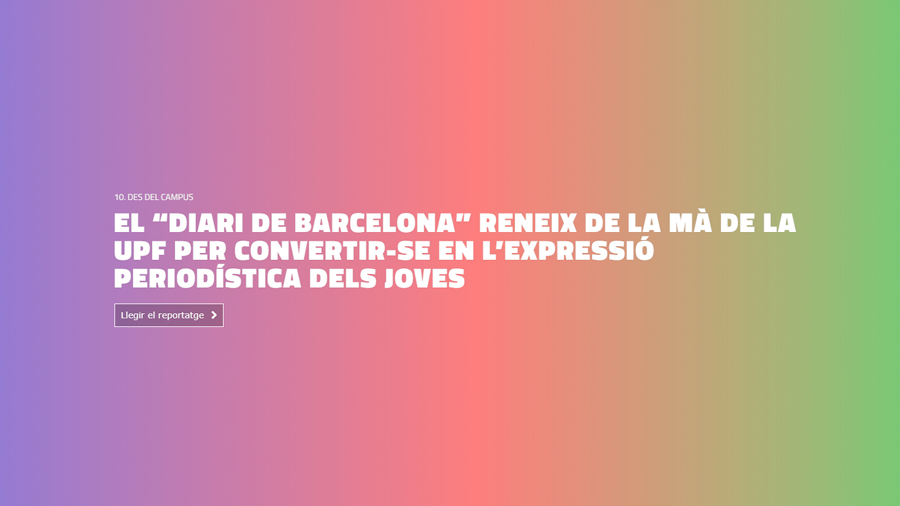Comunitat reportatge
2.1. Community
Overcoming the university’s walls: a moral obligation
UPF is promoting a specific plan of measures to strengthen knowledge transfer to society through a brand new vice-rector’s office.

‘We need to make sure that more of the good research we do reaches society, in order to boost the country’s competitiveness and enhance the population’s wellbeing. To do this, we will redouble our commitment to knowledge transfer.’ It has been almost a year since Oriol Amat, having only recently taken office as the rector of UPF, delivered this powerful message. He continued, ‘The numbers our country is putting up with regard to knowledge production are very good; our scientific output is ten times higher than the global average. The data on the impact this knowledge is having on society, however, are lagging.’
One of the first steps taken to remedy this shortcoming was the creation, for the first time, of a specific Office of the Vice-rector for Knowledge Transfer, with Eulàlia de Nadal at the helm. De Nadal, a full professor in the Department of Medicine and Life Sciences, has made improving the various knowledge transfer indicators the office’s main goal. ‘The new vice-rector’s office is a magnificent opportunity to integrate, visualize and enhance transfer, innovation and entrepreneurship initiatives under a single umbrella’, the vice-rector said.
‘The new vice-rector’s office is a magnificent opportunity to integrate, visualize and enhance transfer, innovation and entrepreneurship initiatives under a single umbrella’
Pompeu Fabra University is a public university. One of its main missions – in addition to promoting quality teaching and top-level research – is for the knowledge it generates to directly benefit society in order to boost the country’s competitiveness and enhance the population’s wellbeing. To this end, the vice-rector’s office ‘has defined four interrelated strategic areas’, de Nadal explained, namely:
-
Valorizing research transfer.
-
Fostering entrepreneurship.
-
Building bridges between private- and public-sector players and the university.
-
Promoting knowledge dissemination.
The main transfer indicators have shown a remarkable evolution in recent years, which makes for an optimistic start. According to de Nadal, ‘The number of priority patents at the university has grown considerably, from three or four a year to the ten we currently have on average. Likewise, the funding obtained to valorize knowledge has increased three-fold in recent times.’ Another example of this positive trend is the six new spin-offs created in the last three years.
‘Nevertheless, we understand that it is not enough, and, from the vice-rector’s office, we aim to improve these results. To this end, we will provide as many tools as possible to promote the transfer of research that is ready to be exploited, whether by creating spin-offs, through agreements with companies and institutions, or by licensing technology and knowledge’, the vice-rector said. Now is a particularly good time to do it, too: public agencies at all levels and various organizations and foundations are publishing new calls for proposals to narrow the gap between science and society. ‘We also need to provide incentives for the knowledge transfer activities our researchers carry out, just as they are evaluated on their teaching and research merits’, she added.
Key knowledge transfer figures
What is knowledge transfer and how is it done?
Through their research activity, universities generate knowledge that can and should be used by their surrounding communities to further economic progress and societal wellbeing. ‘The process of transferring these innovations to the market and society, with the aim of applying them, is called knowledge transfer’, explained Ana Sagardoy, head of the Innovation Unit-UPF Business Shuttle. ‘This process can be broken down into four stages: identification of the innovative results, protection of the industrial and intellectual property rights, valorization, and commercialization. That said, recently a broader understanding of transfer has been gaining ground, based on a two-way perspective, often including references to knowledge exchange or co-creation, as well as other goals, such as impact generation.’
Identificació
Identification of promising research results using technology forecasting to locate possible innovations. Research staff can also proactively report any promising results they obtain in their research to UPF. Once the research results have been identified, the best options for transferring them are studied.
Protecció
In this stage, the relevant legal tools are used to protect the intellectual or industrial property rights to the new knowledge and technology developed at the university. This makes it possible to retain control over its use and, thus, make it more attractive to companies and investors, who will have the necessary guarantees to back these innovations.
Valorització
Often, research results need to mature before they can be exploited. To this end, it is necessary to obtain funding (and, sometimes, training) to develop innovations and test their usefulness through proofs of concept. This reduces the potential risks involved in their exploitation, making it more likely for interested investors and companies to back the projects.
Comercialització
The final stage of the transfer process consists of getting the innovation to market and to society. The knowledge and technology to come out of the university can be exploited through agreements with other organizations, licensing arrangements or the creation of spin-offs.
The Innovation Unit-UPF Business Shuttle ‘works by providing support throughout the research result development and valorization process to facilitate its transfer to the market and to society, as well as promoting partnerships with the business world’, said Sagardoy. ‘We also give researchers and students access to specialized training in transfer and entrepreneurship, whilst trying to promote a cultural shift amongst the university community towards knowledge and innovation transfer activities’, she added.
In this line, for example, the university is promoting programmes of its own to showcase the value of its knowledge, such as UPF INNOValora, the main internal instrument. It also participates in external initiatives, such as the Catalan government’s Knowledge Industry programme or the European Research Council’s Proof of Concept grant programme. Additionally, it helps train its community in the areas of transfer and entrepreneurship. One clear example of this is Start-UPFlama, a programme that provides support for starting innovative companies aimed mainly at UPF students and alumni.
Another avenue of knowledge transfer is when external stakeholders, such as companies and public agencies, have a specific need and approach the university in search of experts to help them solve it and improve their products, services and processes. Whilst in this case, the partnerships can take many forms, the most common are the development of R&D and innovation projects, the provision of consulting and advisory services, and the use of the university’s existing scientific infrastructure.
It is also important to ‘bring our talent closer to the people who can appreciate it and help us develop it’, explained de Nadal. ‘To this end, we strive to be present, as a university, through our researchers and students, in as many knowledge transfer platforms as possible from our environment, such as 4YFN, which is linked to the Mobile World Congress’, she added.

Integra Therapeutics, a good example of a success story
The UPF spin-off Integra Therapeutics, which develops next-generation genetic engineering technologies, has received a 6 million euro investment to boost its business. The venture capital funds Advent France Biotechnology, Invivo Capital, Takeda Ventures and Columbus Venture Partners, specialized in the healthcare sector, participated in this funding round.
The company is working on a gene-writing technology platform with clinical applications that will make advanced therapies for preventing and treating genetic diseases and some types of cancer safer and more effective. It proposes adding a good copy of the damaged gene to the patient’s genome to restore normal function and cause the disease to remit.
The technology has been developed over the last few years by the Research Group on Translational Synthetic Biology at UPF’s Department of Medicine and Life Sciences (MELIS). The company’s co-founders are the head of the research group and scientific director of Integra Therapeutics, Marc Güell, and the researcher Avencia Sánchez-Mejías, who rounds out the management team as CEO. Carles Taulé, the research group’s transfer officer, provides support to the business area.

A boost to technological development and preclinical validation
The capital injection will fund the company’s activities in the coming years, in which Integra Therapeutics will complete the prototype and preclinical validation of the technology platform, both ex vivo and in vivo. ‘We are very grateful for our investors’ confidence. Thanks to their support, we will be able to continue developing this UPF-generated technology with a high potential to cure diseases for which there is currently no treatment’, said Sánchez-Mejías.
The investment will also afford the company access to a board of specialized advisors, in both the technical and business fields, and allow it to expand its team to include business development specialists with experience in the field of advanced therapies, the CEO explained.
Improving the effectiveness and safety of advanced therapies
With regard to the advanced therapies currently in use, Integra Therapeutics’ technology ‘makes it possible to work with large genes more efficiently and also gain precise control of the insertion site’, said Güell. The spin-off thus provides ‘a response to the need for gene-writing technologies proven to be effective and safe’, he added.
How does it do this? The company’s proposal ‘combines the precision of modern systems such as CRISPR with the efficiency of more classical gene-transfer methods, such as integrases and transposases’, the researcher explained. It is a ‘highly universal’ system, Güell continued. ‘It is useful with any type of gene, but we have focused on diseases in which the therapy requires adding a large gene, as our technology has capabilities in this area that set it apart from those currently available’.
Supporting technology transfer
UPF has supported the company’s creation as part of its commitment to transfer knowledge and technology to society. It does so through the Innovation Unit-UPF Business Shuttle and the innovation management company UPF Ventures, promoted and partially owned by the university itself.
In recent years, the technology behind Integra Therapeutics has received support from various programmes to promote knowledge transfer, including the ”la Caixa” and Caixa Capital Risk initiatives CaixaImpulse Validate and Consolidate, the Catalan government’s Innovadors [Innovators] and Knowledge Industry programmes, and the UPF programme to support applied research and proofs of concept, UPF INNOValora.
UPF INNOValora, a unique programme for promoting knowledge transfer

Ensuring that promising research results reach society requires resources. Hence, UPF, through the Innovation Unit-UPF Business Shuttle, has, since 2018, published calls for proposals for the UPF INNOValora programme, an initiative launched with the aim of promoting knowledge valorization by funding proof-of-concept projects linked to the results of research conducted at the university in any discipline.
A total of 16 projects have been promoted in the three editions held to date, each of which has received an injection of 30,000 euros. In the 2021 edition, the Board of Trustees additionally provided 3,000 euros in funding to each project for training in transfer, innovation and entrepreneurship and awarded a special prize worth 5,000 euros to the project considered most promising in terms of its focus and expected impact on the market.
Thanks to this support, researchers can carry out proofs of concept with their innovations to accelerate their development and determine whether they have the potential to be put into practice.
The initiative, which is part of the Action Plan for the UPF Valora Horitzó 2025 project, aims to promote innovation and social transformation by fostering synergies with society and contributing to societal welfare and value creation. It has the support of the Catalan Ministry for Universities and Research, as well as co-funding from the European Regional Development Fund (ERDF).
The selected projects
2018
2019
2021
Key concepts from the world of transfer, innovation and entrepreneurship (TIE)
Knowledge transfer in humanities and the social sciences: debunking myths
‘Current transfer indicators do show a steady increase in the funding obtained in the fields of both biomedicine and information and communication technologies. However, the humanities and social sciences are quite active with transfer formulas such as contracts with companies and institutions, partnership agreements, company or government agency chairs, and industrial doctorates’, explained Vice-Rector de Nadal.
‘The fields of the humanities and social sciences are quite active with transfer formulas such as contracts with companies and institutions, partnership agreements, company or government agency chairs, and industrial doctorates’
One of the first actions of the new stage, precisely to shore up this area, has been the recruitment of Helena Ramalhinho, a full professor in the Department of Economics and Business at UPF, as delegate for Knowledge Transfer in the Social and Human Sciences. Her main objective is ‘to encourage those areas of the university most removed from the traditional concept of knowledge transfer to find innovative ways of approaching it’. Additionally, ‘we aim to identify initiatives that are already underway in order to determine as well as possible the most representative indicators in these areas’. In the first stage, in which all UPF’s departments were visited, great examples of transfer were found in areas of the humanities and social sciences, such as the UPF Legal Clinic (law) or the Diari de Barcelona (communication).
One of the main avenues for transfer in these knowledge areas is the participation of researchers from the university as experts on advisory committees to public institutions. Clear examples of this are the appointment of Guillem López Casanovas, a full professor in the Department of Economics and Business, as a member of the Catalan government’s Catalonia-Next Generation EU Advisory Committee; the appointment of Joan Benach, a full professor in the Department of Political and Social Sciences, as coordinator of the Spanish Ministry of Labour’s expert committee on the impact of job insecurity on mental health; and the participation of Migle Laukyte, a lecturer in the Department of Law, as a member of the European Group on Ethics in Science and New Technologies, an independent advisory group to the European Commission.
This trend towards a broader concept of knowledge transfer is gaining more and more ground at the European level, prompting an evolution in the definition of the concepts: ‘There is increasing talk of the concept of ‘knowledge exchange’, understood not as a one-way action from the university outwards, as the word ‘transfer’ might suggest, but a two-way process between the university and other external actors for the exchange of ideas, knowledge and expertise, which is enriching for everyone and of social and economic benefit to the community as a whole’, said de Nadal.
UPF Knowledge, the future knowledge dissemination platform
One of the most interesting new actions being promoted in this area is the creation of UPF Knowledge, a platform to disseminate the knowledge generated at the university, in the areas of research and knowledge transfer, teaching and outreach. The project aims to increase and encourage the creation of publications and outreach activity by UPF teaching staff, in keeping with the university’s mission of transferring knowledge to society.
With this aim, publication collections will be launched, mainly online, to enhance the dissemination of this knowledge and boost its social impact. Initially, three main content lines are planned:
-
Research and knowledge transfer: works intended for researchers from each discipline; they will therefore be targeted at a specialist audience and take the form of books or research papers by the university’s research centres and groups and its departments.
-
Teaching: works aimed at students and other teaching staff. They will include university manuals, case studies and other types of teaching materials and will be intended as supplementary materials for studying and teaching.
-
Outreach: works by renowned experts from UPF on key topics of current interest in relevant and important fields made available to the lay public. Their purpose will be to transfer the knowledge found at the university to society at large through a widely circulated collection. They may be produced in a variety of formats, such as books, videos or podcasts.
These publications will be presented jointly through a web portal with a distinct visual image to help identify them and boost their profile abroad. The main aim of the new initiative is thus to ensure that the knowledge generated at UPF reaches society. However, it will also emphasize specific audiences, such as students, teaching staff and researchers in academia.
Members of the UPF Knowledge Advisory Board
-
Joaquim Albareda Salvadó, lecturer in the Department of Humanities, who will chair the board
-
David Sancho Royo, vice-rector to the rector for Organization and UPF Group and lecturer in the Department of Political and Social Sciences
-
Manel Jiménez Morales, vice-rector for Educational Transformation, Culture and Communication and lecturer in the Department of Communication
-
Eulàlia de Nadal Clanchet, vice-rector for Knowledge Transfer and lecturer in the Department of Medicine and Life Sciences
-
Tomàs de Montagut i Estragués, lecturer in the Department of Law
-
Javier Aparicio Maydeu, lecturer in the Department of Humanities
-
Davinia Hernandez-Leo, lecturer in the Department of Information and Communication Technologies
-
Mercè Lorente Casafont, lecturer in the Department of Translation and Language Sciences
-
Vicente Ortun Rubio, lecturer in the Department of Economics and Business
-
The head of the Rector’s Office
-
The director of the Library
-
The deputy general manager of the Services, Technology and Information Resources Area
-
Mathilde Brodu, external advisor on culture
-
Dolors Pons Sala, head of the Library’s Resource Management Unit, who will attend the board meetings in a non-voting, advisory capacity


